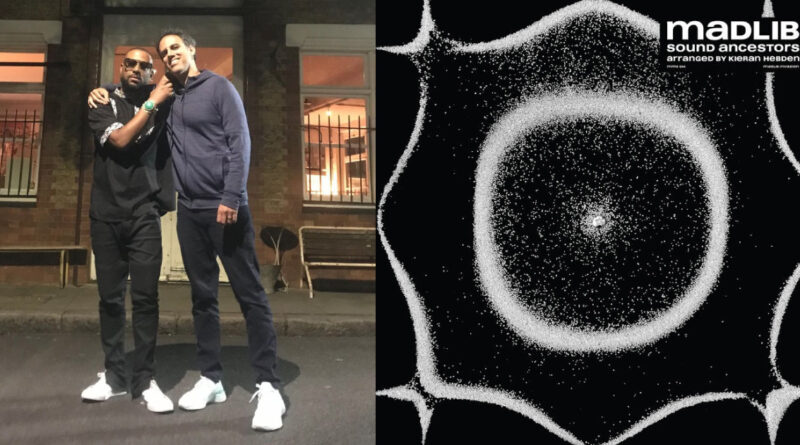Madlib Taps Four Tet To Unlock The Secrets Of ‘Sound Ancestors’ [B.Getz on L4LM]
Eclectic producer Madlib is a household name in a number of beat scenes and culture circles, his contributions dating back almost three decades. From his celebrated MF DOOM collabs like the timeless Madvillainy or a reimagining of the dusty Blue Note vaults, his presence and presents are omnipresent in the hip-hop pantheon. He’s beloved for his work with Erykah Badu, Freddie Gibbs, Anderson .Paak, and Kanye West, his minimalist panache blessing each artist with smoked-out layer cakes and ever-inventive touch. Madlib’s name and sonic aesthetics are synonymous with lo-fi beat science and the culture that surrounds that sound.
In the mid-1990s, a fledgling Madlib dropped bangers behind seminal West Coast ragers Tha Alkaholiks as well as the slept-on trio Lootpack. Later, he conceived a tribute to the late Weldon Irvine, crafted full-blown psychedelic cartoon characters and concept albums as Quasimoto, unveiled jazzier nom-de-plumes with Yesterday’s New Quintet, The Last Electro-Acoustic Space Jazz & Percussion Ensemble, Monk Hughes & The Outer Realm, among other deep dives into heady spaces. Then there’s his titanic 2003 convergence with the late J Dilla, a unification of two shape-shifting producers-who-rap. The seismic thunderclap that was Jaylib‘s Champion Sound was released on venerable tastemaker label Stones Throw and is seen as a pivotal document in both artist’s careers.
The dreamy, dusted genius of Madlib seems to know no boundaries, and the dude’s got mad degrees up on the wall; the Beat-Conducta is production bonafides personified. But until this week, the Oxnard, CA-born Otis Jackson Jr. had never put out a traditional, full-length solo album. Sound Ancestors (Madlib Invazion) welds Madlib’s vast influences and trademark techniques into a lush, long-form listening experience. It snakes in the storied, sampledelic lineage of DJ Cam’s Mad Blunted Jazz, DJ Shadow’s Endtroducing, RJD2‘s Deadringer, J Dilla’s Donuts, or Flying Lotus’ Los Angeles.
It’s the first release in a long time to bear only Madlib’s name, and presents as a “debut” solo project—a concept Madlib had to be cajoled into considering. While it bears the Madlib moniker, it was someone else who held the keys to the veritable kingdom that beheld Sound Ancestors.
British electronic musician Four Tet (real name Kieran Hebden) has been a long-distance friend to Madlib for quite a long time. Game recognize game, and a mutual trust and admiration was swiftly established. For roughly two years beginning in 2018, Four Tet quietly collected hundreds of Madlib’s beats and snippets, creative sparks of themes and ideas that Jackson had privately shared with him. With that source material, Kieran began piecing together a document on behalf of the Beat Conducta, adding zero new sounds to the stew. In the end, Four Tet hand-crafted an album of entirely new Madlib joints. The fruits of that peculiar process are what you hear on Sound Ancestors.
Obscure field recordings, ethereal sonic landscapes, tribal riddims, and esoteric chants populate a luscious, primordial beat-tape in the true essence of the template on Sound Ancestors. Invasion-era Brit Terry Britten’s atypical rock vocal is worked into a frenzied, familiar refrain at the top of “The Call”, the sample chopped into a RZA-meets-Lennon elixir that astounds right out of the gate. “Theme De Crabtree” is blunted boom-bap pedigree, cypher sounds drenched in the dubbed-out vibrations of a yardie soundsystem.
The high-water mark of a record brimming with rising tides, “Road of the Lonely Ones” is damn near perfection. Madlib flips two lost classics courtesy of Philly soul OGs The Ethics; a smooth operation set atop funky-ass drums from the reborn J-Zone and deftly inserted into an orgasmic instrumental hip-hop number that brings the feels in abundance.
Though Madlib is more or less a hip-hop cat and Four Tet makes what can be described as intelligent contemporary dance music, the two artists are both dedicated crate-diggers, sonic archeologists who independently mine the same obscure corners of the land and leagues beneath the sea. Both producers profess a deep appreciation for kaleidoscopic free jazz, British psychedelic rock deep cuts, the glorious J Dilla (with whom they both collaborated), and obscure, indigenous micro-genres bear a wealth of inspiration.
Other highlights include a Snoop Dogg sample strewn atop a wobbly, tangerine dancehall riddim on “Loose Goose”, the straight-ahead backpack swagger of “Riddim Chant”, and the pristine, ornate guitars and percussion on “Latino Negro”. The hazy “Two for 2 – For Dilla” is self-explanatory, a heroic sendup for the dearly departed Mr. Yancey.
Elements of Brazilian polyrhythms pulse, early-’80s UK post-punk group Young Marble Giants are injected into the amorphous solution. The thrilling vessel pulls into port on “Duumbiyay” with a spirited sample from Harlem’s archaic troupe Six Boys From Hell. It’s a Smithsonian relic subtly-woven with a two-chord piano vamp, a minimalist pairing that makes for an appropriate departure point from this vibrant listening experience.
Madlib has long colored way outside of the hip-hop lines, and Four Tet approaches music-making with similar ethos and modus operandi. Prolific, idiosyncratic, and elusive, their rock-solid reputations have been defined by tireless waves of avant-garde sound art and creative collaboration. Forever blunted in his barricaded bomb shelter, Madlib carves new narratives and reveals riveting themes born out of classic materials. He reinvents the source recordings, consistently pushes the art of sampling to further frontiers in the never-ending search for new land. On Sound Ancestors, Madlib makes undeniably high art, and his craft continues its unwavering trajectory skyward.
Madlib – Sound Ancestors – Full Album
words: B.Getz

